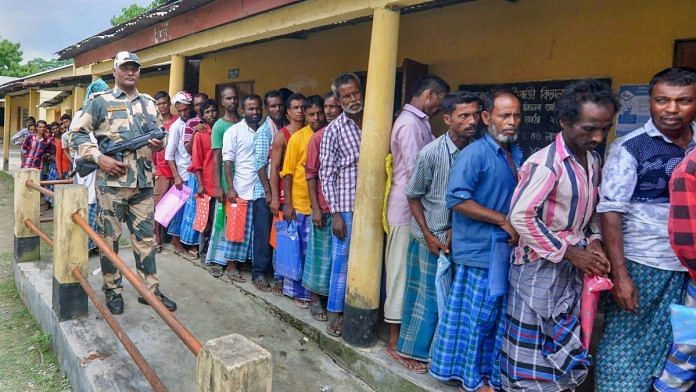In Assam, basic dignity at stake
Sanjoy Hazarika | International Director, Commonwealth Human Rights Initiative
The Hindu
Hazarika discusses the National Register of Citizens (NRC), and speculatively answers the question of “what happens to those individuals (and their dependents) who are deemed stateless after they find themselves off the list”. He writes that the emerging situation indicates that the alleged foreigners might not be displaced and will be provided rights “that will enable their survival”, for instance, the right to education and health.
However, they won’t be provided the right to vote or to acquire property, thereby ensuring that they don’t play a role in political processes, he adds.
He also writes that more clarification is required to know the status of lands, which have already been acquired. He asks if the people will be deprived of these lands. He writes that many people who are not on the list are poor, they don’t “even know of their right to legal aid”, and thus “the basic dignity of the weak, voiceless and vulnerable” is at stake.
Behind the veil: The goings on in our political parties resemble how the Ottoman Sultans functioned
Ira Pande | The writer is an author and editor
The Times of India
Pande draws parallels between some of the practices of Ottoman Sultans and the present day opposition political parties in India. She writes that in the Ottoman empire, the ruling Sultan’s mother — called the Walide Sultana — used to be the “presiding chief of the harem”.
Access to the harem was restricted to just the Sultan and his sons. Also, “the harem was guarded by eunuchs whose tongues were cut off so that no tales were ever carried outside”, she writes. Further, the Sultan used to lock up all his brothers on acquiring power.
She writes that India’s opposition parties also functioned in a similar manner. People took an oath of secrecy about the royal family, and a culture of “lies and sycophancy” prevailed as the “tongueless” focused on their survival. And now, power has been acquired by a “rival sultan”, who is out there to eliminate all the opposition.
Change without reform
Tahir Mahmood | The writer is former chairman of National Minorities Commission, and member, Law Commission of India
The Indian Express
Mahmood discusses the evolution of the National Human Rights Commission (NHRC) since its inception, and argues that the latest Protection of Human Rights (Amendment) Bill, 2019, also fails to empower the commission.
He points out that under the amended law, the government can now appoint any former Supreme Court judge as the chair of NHRC. Earlier, the position was restricted to only former chief justices of the apex court. He is uncertain, though, if this change is “for the better or worse”.
He also mentions that while the amendment raises the number of non-judge members of the commission from two to three, successive governments have never actually filled those positions with specialists or known human rights activists.
He concludes by saying that the situation of human rights in the country continues to remain bad, and asks “is there really no way to make it [NHRC] a truly effective watchdog?”
Needed: A trilateral pact on the Brahmaputra river
Nilanthi Samaranayake | Director, strategy and policy analysis, CNA
Hindustan Times
Samaranayake argues that India, Bangladesh and China should sign a trilateral agreement on Brahmaputra river as it will be beneficial for all the three countries.
China will benefit as it will be able to “demonstrate leadership on a serious issue of human security and improve its international reputation, which has been damaged by the country’s assertiveness in East Asian waters”.
India will benefit not only from data-sharing with China to avoid flooding, “but also from the exchange of information about hydropower dam construction [in China]”.
And Bangladesh, which is in fact eager for an arrangement, suffers from widespread erosion and flooding since it lies downstream of China and India. Thus, it will benefit the most, she writes.
She recommends the formation of a Brahmaputra Basin Commission as one of the goals.
Give up the misplaced faith in a fiscal-driven rescue
Ajit Ranade | Economist and a senior fellow at The Takshashila Institution
Mint
Ranade starts out by pointing that India’s economic problems cannot be resolved just through monetary solutions. However, he argues, that this “does not automatically mean only a fiscal stimulus”.
He cites the philosophy of Friedrich Hayek to suggest that a fiscal stimulus is akin to saying, “Let’s spend other people’s money”.
He further writes that excess fiscal spending is analogous to “taking resources from tomorrow”, and cites Ricardian Equivalence to explain the limited impact of fiscal policy. He, however, accepts that the empirical findings on Ricardian Equivalence are “somewhat mixed”.
He recommends that to solve its economic problems, India should improve its ease of doing business, carry out privatisation, clear government’s overdue payments and increase aggregate savings.
Think before you leap
Renu Kohli | The author is a New Delhi-based macroeconomist
Financial Express
Kohli talks about the recent debate, which has started on India’s plans of taking sovereign debt denominated in foreign currency. She writes that the recommendations of the Tarapore Committees of 1997 and 2006 can better inform this debate. Some of the recommendations of the committee for more capital account convertibility included reduction of fiscal deficit to 3 per cent of GDP, “elimination of revenue deficit by March 31, 2008, and building a revenue surplus”. It also advocated moving to a public sector borrowing requirement (PSBR) measure instead of fiscal deficit.
Presently, she mentions that key fiscal indicators don’t display an improved trend, revenue deficit has increased, and gross tax revenues have dropped. Also, PSBR hasn’t still become relevant in the fiscal framework.
The government’s focus on fiscal deficit makes it “move capital expenditure outside the budget”.
She argues, thus, that “countries without solid fiscal and financial sectors should avoid borrowing in foreign currency”.






